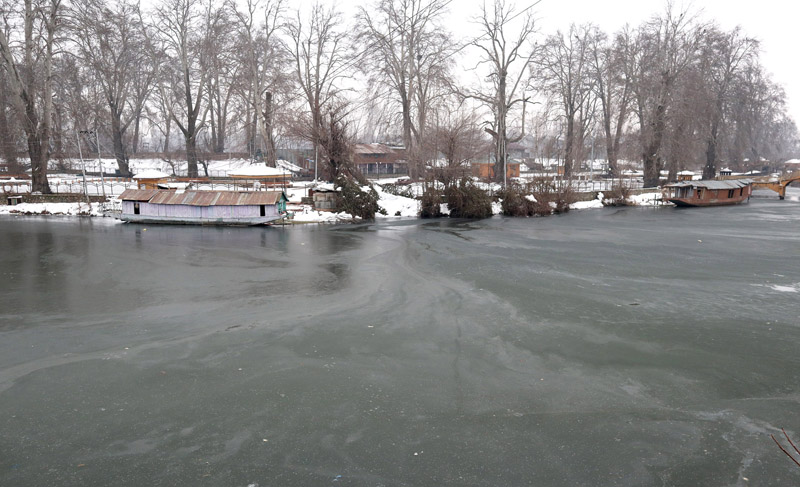Suhail Bhat
Srinagar, Jan 29: As the temperature remains several notches below the freezing point, people are struggling with a water crisis because of freezing water taps, springs and supply lines across Kashmir.
Kashmir valley is reeling under an intense cold wave since the heavy snowfall earlier this month. The intense cold has resulted in the freezing of water supply lines and water bodies in several areas, including Dal lake.
The freezing of water pipes has caused water crisis across the Valley with people adopting different ways to de-freeze the water pipes. “All the water pipes that carry water to my house are blocked for last one month. Every day it takes me almost 2-3 hours to defreeze the water pipes, and my success rate is low. I have used every means to prevent the freezing, but I have failed to ensure the uninterrupted water supply,” Nasir Ahmad, a resident of Srinagar told Excelsior.
The complaints of water shortage have been pouring in since the beginning of the Chillai Kalan, 40-day harsh winter period, as the temperature has broken decades-old record this year with the Valley witnessing the coldest January since 1991.
In Srinagar city, people were seen using different techniques to thaw their water pipes to restore water supply. “For the past one month, we are facing a water crisis due to frozen pipes. We have to wait till noon for the ice to melt. This is the worst winter I have witnessed in my life,” a 60-year-old, Bashir Ahmad, a resident of Shopian said.
The worst affected are the people living in the remote villages of South Kashmir who depend on fresh springs for their water needs. The residents, particularly the womenfolk, complained that they have been collecting thaw, which is mostly contaminated and not fit for human consumption, as the water has frozen in the severe cold.
“We do not have any other source of drinking water. We depend heavily on the springs, which have frozen now or are covered with snow. It takes us hours to collect thaw and store it,” Rafiqa Akhtar, a resident of Batpora village in Kulgam district, said, adding that the day is gone in melting and storing water from the thaw amid the bone-chilling cold.
The residents from North Kashmir echoed similar concerns. “People here are facing water shortage since Chillai Kalan. The winter this time seems to stay for a long time. Lack of water is affecting our daily life, ,” resident of Kralgund Handwara, said.
Chief Engineer Jal Shakti Department, Iftikar Wani, told Excelsior that there was no shortage of water but the problems have arisen due to the freezing of supply lines. “The supply lines are jammed at some places due to sub-zero temperature, but we have kept blue lamps across the Valley for defreezing,” he said.
Asked about the lack of water in some remote areas, “we have established control rooms across the Valley in order to receive distress calls. We have also made the water tanks available across the Valley,” he said, adding that the problem is likely to end next month as the harsh period of winter would end after 31st January.
Valley in grip of severe cold
The intense cold weather conditions continue to grip Kashmir with mercury tumbling to minus 7.7 degree Celsius in Srinagar and Gulmarg being coldest in the region at minus 13.4 degree Celsius.
A Meteorological Department official said that the minimum temperature fell more than two degrees Celsius from minus 5.6 degree Celsius the previous night in Srinagar and settled at minus 7.7 degree Celsius.
The minimum temperatures have consistently remained far below normal this season. On January 14, Srinagar witnessed the season’s coldest night at minus 8.4°C which was the chilliest in three decades. In 1991, Srinagar witnessed a low of minus 11.8 degree Celsius.
The mercury settled at minus 12.0 degree Celsius in Pahalgam against minus 12.0 degree Celsius the previous night.
Qazigund recorded a low of minus 10.8 degree Celsius against minus 10.5 degree Celsius the previous night while Kokernag had a minimum of minus 11.4 degree Celsius against minus 10.7 degree Celsius the previous night.
Gulmarg recorded a low of minus 11.5 degree Celsius against minus 13.4 degree Celsius previous night.
The Mercury settled at minus 3.0 degree Celsius in Kupwara against minus 2.2 degree Celsius the previous night.
And Dal lake and other water bodies continued to be frozen. The boatmen faced difficulty in rowing their boats in the frozen lake. They had to cut the ice to make way for their boats. The other water bodies including ponds were also frozen across Kashmir.
The water taps continue to be frozen leading to water shortage across Kashmir. In the morning and evening the roads had become a sheet of ice causing slippery conditions.
The present wintry period Chillai-Kalan, the 40-day winter period which commenced on December 21, ends on January 31.
The period is considered the harshest of the winter when the chances of snowfall are most frequent and maximum. So far this season there have been already at least two spells of considerable snowfall.
The cold wave, however, continues even after that in Kashmir with a 20-day-long ‘Chillai-Khurd’ (small cold) and a 10-day-long ‘Chillai-Bachha’ (baby cold).
The weatherman has forecast “mainly dry and cold weather with the possibility of morning mist in plains of J&K regions” for the next 24 hours. For the subsequent two days, the forecast is “dry weather to isolated light rain /snow/thundershowers.”


